View this page in 103 different languages!
12 Felony Forgeries against Jesus Christ in the bible
Teaching Outline:
- Introduction
- How do the oldest, most authoritative biblical manuscripts render 1 Timothy 3:16?
- Biblical evidence proves the Felony Forgery of 1 Tim 3:16
- How do a dozen randomly selected bible versions render 1 Timothy 3:16?
- 16 point summary
INTRODUCTION
1 Timothy 3:16 [kjv]And without controversy great is the mystery of godliness: God was manifest in the flesh, justified in the Spirit, seen of angels, preached unto the Gentiles, believed on in the world, received up into glory.
1 Timothy 3:16 is often used as a "proof" of the trinity.
The way this verse is mistranslated, its no wonder.
It really does look like proof of the trinity and the deity of Jesus Christ.
But once anybody quotes this verse to prove the trinity, you know they haven't done their homework.
Once you look at the ancient text of 1 Timothy 3:16 Greek, you will understand.
When you're finished with this article, you will have absolute certainty of what 1 Timothy 3:16 actually says and why.
See for yourself the proof that the trinity violates the laws of mathematics and logic that God created!
What do the ancient biblical manuscripts say about 1 Timothy 3:16?
First we will look at a screenshot of a Greek interlinear of 1 Timothy 3:16 and can verify that the word "God" is not in here, but rather "who" instead.
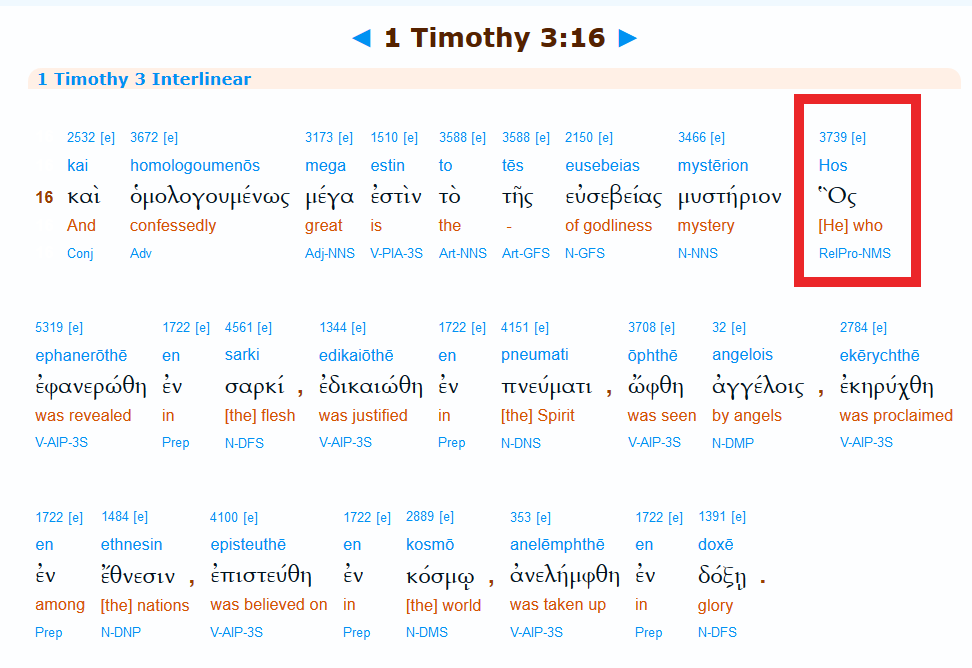
Next, we can look at a Greek Lexicon of 1 Timothy 3:16, which verifies the Greek interlinear.
Next, we can look at the Mounce reverse Greek interlinear of 1 Timothy 3:16.
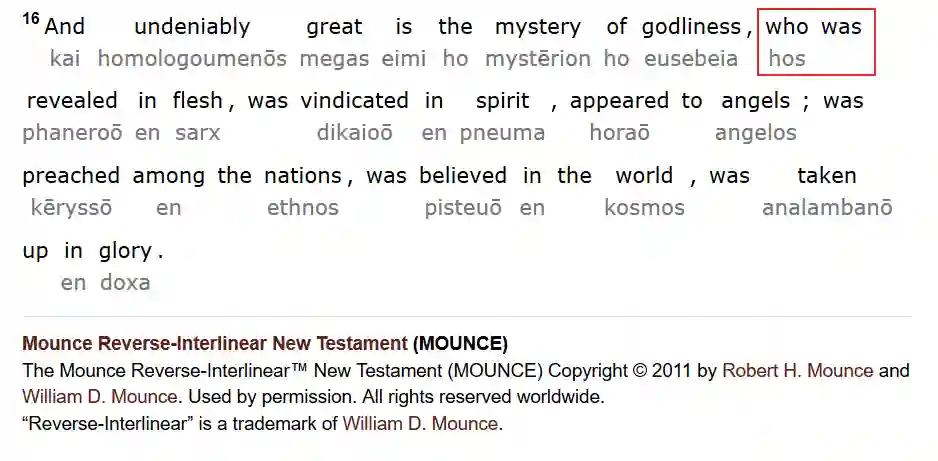
Codex Sinaiticus, the oldest complete Greek new testament in existence, dating back to the 4th century [if you go here, look at the lower-right quadrant of the screen and scroll down to 1 Timothy 3:16].
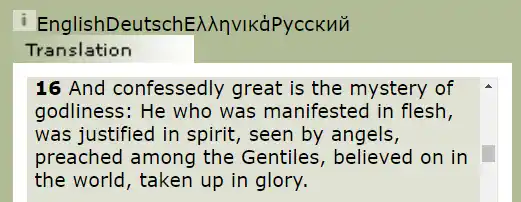
1 tim 3:16 in the Lamsa bible - Aramaic text - 5th century.

St. Jerome's Latin Vulgate 405A.D. of 1 Timothy 3:16.

Armenian bible – translated from the Peshitta Syriac text in 411AD of I Timothy 3:16
and openly in the godly counsel, manifested in the flesh, justified in the Spirit, seen by angels, preached among the nations, was believed in heaven and glory.
The NET BIBLE is a completely new translation of the Bible! It was completed by more than 25 scholars – experts in the original biblical languages – who worked directly from the best currently available Hebrew, Aramaic, and Greek texts.
![screenshot of I Timothy 3:16 in the NET [New English Translation] bible.](https://biblebookprofiler.com/images/screenshot-I-timothy-3-16-NET-bible.webp)
Coptic text – from ancient Egyptian – 4th & 9th centuryAD of I Timothy 3:16
'^ And confessedly, great is the mystery of the godliness, *that
which was manifested in (the) flesh, was justified in the sjnrit [spirit],
was manifested unto the angels, was proclaimed among the
ncdions [nations], was believed in the tuorld [world], was taken up away
^ Lit. 'be, having become.' ^ Or 'he who.
Near the bottom of the page, look at some quoted highlights of the footnote: [My clarifications are in square brackets]
As TCGNT [Textual Commentary of the Greek New Testament] 574 notes:
Definition of Patristic
pa·tris·tic [puh-tris-tik]
adjective
of or pertaining to the fathers of the Christian church or their writings.
In light of the last fact (and no patristic writer prior to the last third of the fourth century testifies to the reading θεός [Theos = God].”), it is interesting to note that the third part of the trinity had just come into being by the commandments of men in 381A.D.
Encyclopedia Britannica on Council-of-Constantinople
“Council of Constantinople, (381), the second ecumenical council of the Christian church, summoned by the emperor Theodosius I and meeting in Constantinople. Doctrinally, it promulgated what became known to the church as the Nicene Creed; it also declared finally the Trinitarian doctrine of the equality of the Holy Spirit with the Father and the Son.”
Thus, some of the newer texts that read theos [God] were changed many centuries after the bible was already written, and contradict all the oldest uncial manuscripts. Therefore, they are a deliberate corruption of I Timothy 3:16. The companion bible details how it happened.
Screenshot of the Companion Reference Bible; notes on I Timothy 3:16.
Notice that in the blue box, I Timothy 4:1 is highlighted.
"Now the Spirit speaketh expressly, that in the latter times some shall depart from the faith, giving heed to seducing spirits, and doctrines of devils."
In other words, seducing spirits and doctrines of devils lead to the felony forgery of I Timothy 3:16.
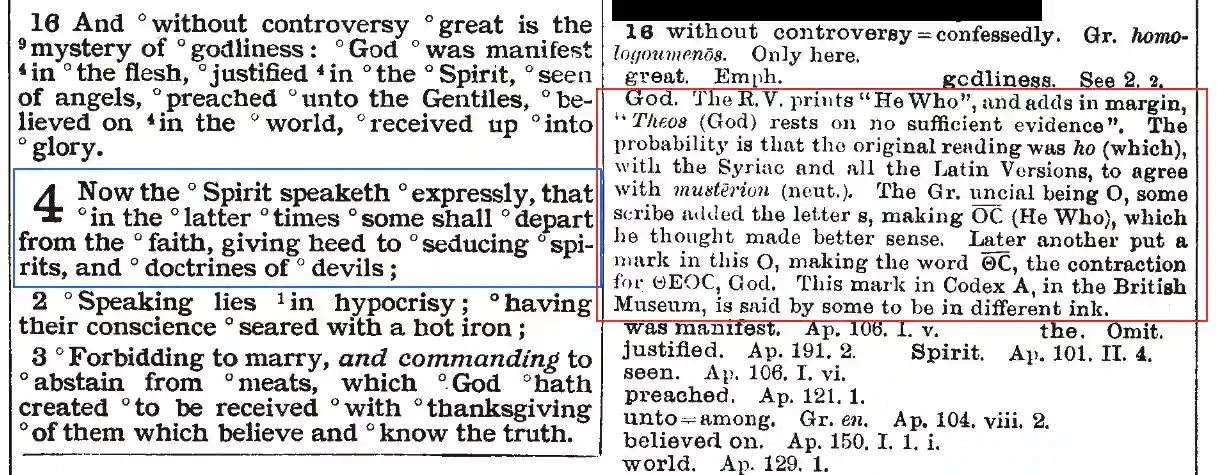
Facsimile of the Codex Alexandrinus
“Tregelles writes, "The ink in which this has been done in A is sufficiently modern and black to declare its recent application" (An Account of the Printed Text of the Greek New Testament, London, 1854). Without these marks, the manuscript originally read ΟC "He who was manifested in the flesh."”
1 Timothy 3:16 in Codex Alexandrinus
Reproduced below is the text of 1 Timothy 3:16–4:3 from Codex A, as presented in the photographic facsimile volume published by the British Museum in 1879. Of particular interest here is the reading in 3:16, where it may be seen that the manuscript reads ΘC "God was manifested in the flesh," employing the usual abbreviation ΘC for ΘEOC, with a stroke over the letters to indicate an abbreviation.
However, textual critics believe that the ink in the center of the Θ and the stroke above were added by a corrector in modern times. Reasons for this belief are the color of the ink, and the fact that a "dot" has been placed in the Θ instead of a line.
Without these marks, the manuscript originally read ΟC "He who was manifested in the flesh." In the photograph below the ΘC in 3:16 is circled. Further down, in verse 4:3, there is another ΘC circled for comparison.
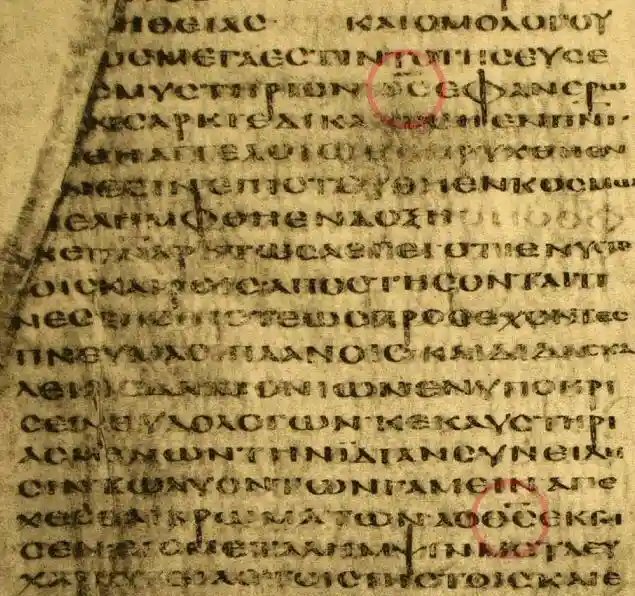

Malachi 3:6
For I am the Lord, I change not; therefore ye sons of Jacob are not consumed.
God's original word never changes, therefore, all these subsequent changes cannot be authored by the one true God, the author of the bible.
So far, all the evidence against the word "God" being in this verse is classified as external,
but what about the internal evidence?
All we have to do is compare the wording of the controversial rendering of this verse to other verses in the bible to see if there are any contradictions or not. If there are contradictions, then we know this can't be the original word of God. Does that make sense? King James Version (KJV)
16 And without controversy great is the mystery of godliness: God was manifest in the flesh, justified in the Spirit, seen of angels, preached unto the Gentiles, believed on in the world, received up into glory.
"God was manifest in the flesh:" there is no verse in the bible that supports this statement; only religious opinions. If God were truly manifested in the flesh, then obviously, people would be able to see him.
John 1:18
No man hath seen God at any time, the only begotten Son, which is in the bosom of the Father, he hath declared him.
1 John 4:12
No man hath seen God at any time. If we love one another, God dwelleth in us, and his love is perfected in us.
"justified in the Spirit:" Since when does God need to be justified???
Romans 3
21 But now the righteousness of God without the law is manifested, being witnessed by the law and the prophets;
This establishes the context - the righteousness of God.
22 Even the righteousness of God which is by faith of Jesus Christ unto all and upon all them that believe: for there is no difference:
There it is again, the righteousness of God. God is the standard of righteousness. Therefore, he is righteous.
23 For all have sinned, and come short of the glory of God;
24 Being justified freely by his grace through the redemption that is in Christ Jesus:
We are freely justified by God through his son Jesus Christ. Therefore, God has to be just in order to justify us. Otherwise, you have the unjust trying to justify the unjust, which is no different than the blind leading the blind.
25 Whom God hath set forth to be a propitiation [payment] through faith in his blood, to declare his [God's] righteousness for the remission of sins that are past, through the forbearance of God;
26 To declare, I say, at this time his [God's] righteousness:[second time God declares his righteousness] that he [God] might be just, and the justifier of him which believeth in Jesus.
So once again, the reading of God contradicts more scripture and the laws of logic.
"seen of angels": there are no verses in the bible that talk about angels seeing God. This again contradicts the 2 verses in John & I John about no man has ever seen God.
I Timothy 1:17
Now unto the King eternal, immortal, invisible, the only wise God, be honour and glory for ever and ever. Amen.
God is invisible, so how could he ever be seen?
"preached unto the Gentiles,": God certainly was preached unto the gentiles, especially by the apostle Paul, who was specifically called to preach to the gentiles.
"believed on in the world:" Many people have believed on God in the world, even though many have not, so this part of this rendering of I Timothy 3:16 is correct.
"received up into glory:" Seriously? How could God be "received up into glory"?
There are 2 problems with this statement:
FIRST, God is already "up"; i.e. he's already in heaven and everywhere present, so how could he "get" there since he's already there?
SECONDLY, how could he be received up into glory when God is already glorious to begin with? "received up into glory" implies that he's not glorious now, which is absolutely false. This is proven by countless scriptures just in the old testament alone.
Numbers 14:21
But as truly as I live, all the earth shall be filled with the glory of the Lord.
1 Chronicles 29:11
Thine, O Lord is the greatness, and the power, and the glory, and the victory, and the majesty: for all that is in the heaven and in the earth is thine; thine is the kingdom, O Lord, and thou art exalted as head above all.
Psalm 113:4
The Lord is high above all nations, and his glory above the heavens.
Psalm 148:13
Let them praise the name of the Lord: for his name alone is excellent; his glory is above the earth and heaven.
So the phrase "received up into glory:", in reference to God, is wrong on two different issues [up & glory] and is contradicted by dozens upon dozens of scriptures just in the old testament alone.
What does this verse say in 12 randomly sampled bible versions?
American Standard Version; Names of God Bible; Worldwide English (New Testament) (WE); J.B. Phillips New Testament (PHILLIPS)American Standard Version (ASV)
16 And without controversy great is the mystery of godliness; He who was manifested in the flesh, Justified in the spirit, Seen of angels, Preached among the nations, Believed on in the world, Received up in glory.
Names of God Bible (NOG)
16 The mystery that gives us our reverence for God is acknowledged to be great:
He[c] appeared in his human nature,
was approved by the Spirit,
was seen by angels,
was announced throughout the nations,
was believed in the world,
and was taken to heaven in glory.
Worldwide English (New Testament) (WE)
16 God's plan is very great as we all know. Here it is: we saw God as a man; God's Spirit proved he was right; angels saw him; the nations were told about him; people of the world believed in him; God took him up into heaven.
J.B. Phillips New Testament (PHILLIPS)
16 No one can deny that this religion of ours is a tremendous mystery, resting as it does on the one who showed himself as a human being, and met, as such, every demand of the Spirit in the sight of angels as well as of men. Then, after his restoration to the Heaven from whence he came, he has been proclaimed among men of different nationalities and believed in all parts of the world.
Here's the next batch of four.
King James Version (KJV); New Revised Standard Version Catholic Edition (NRSVCE); New International Reader's Version (NIRV); Common English Bible (CEB)
King James Version (KJV)
16 And without controversy great is the mystery of godliness: God was manifest in the flesh, justified in the Spirit, seen of angels, preached unto the Gentiles, believed on in the world, received up into glory.
New Revised Standard Version Catholic Edition (NRSVCE)
16 Without any doubt, the mystery of our religion is great:
He[g] was revealed in flesh,
vindicated[h] in spirit,[i]
seen by angels,
proclaimed among Gentiles,
believed in throughout the world,
taken up in glory.
New International Reader's Version (NIRV)
16 There is no doubt that godliness is a great mystery.
Jesus appeared in a body.
The Holy Spirit proved that he was the Son of God.
He was seen by angels.
He was preached among the nations.
People in the world believed in him.
He was taken up to heaven in glory.
Common English Bible (CEB)
16 Without question, the mystery of godliness is great: he was revealed as a human, declared righteous by the Spirit, seen by angels, preached throughout the nations, believed in around the world, and taken up in glory.
Now for the final four.
Contemporary English Version (CEV); New Century Version (NCV); Good News Translation (GNT); The Message (MSG)
Contemporary English Version (CEV)
16 Here is the great mystery of our religion:
Christ[g] came as a human.
The Spirit proved
that he pleased God,
and he was seen by angels.
Christ was preached
to the nations.
People in this world
put their faith in him,
and he was taken up to glory.
New Century Version (NCV)
16 Without doubt, the secret of our life of worship is great:
He[b] was shown to us in a human body,
proved right in spirit,
and seen by angels.
He was proclaimed to the nations,
believed in by the world,
and taken up in glory.
Good News Translation (GNT)
16 No one can deny how great is the secret of our religion:
He appeared in human form,
was shown to be right by the Spirit,[d]
and was seen by angels.
He was preached among the nations,
was believed in throughout the world,
and was taken up to heaven.
The Message (MSG)
This Christian life is a great mystery, far exceeding our understanding, but some things are clear enough:
He appeared in a human body,
was proved right by the invisible Spirit,
was seen by angels.
He was proclaimed among all kinds of peoples,
believed in all over the world,
taken up into heavenly glory.
SUMMARY
- Only three of twelve (25%) randomly selected modern bible versions have the word “God” in this verse (Names of God bible) (NOG), Worldwide English (New Testament) (WE), and the King James (KJV).
- 3 additional Greek interlinears do not have the word "God" [theos] in them
- The Codex Sinaiticus, the oldest complete Greek new testament from the 4th century does not have the word "God" [theos] in it
- The Lamsa bible, an Aramaic text from the 5th century, does not have the word "God" [theos] in it
- St. Jerome's Latin Vulgate from 405AD does not have the word "God" [theos] in it
- The Armenian bible, translated from the Peshitta Syriac text in 411AD, does not have the word "God" [theos] in it
- The New-English-Translation-NET-Bible does not have the word "God" [theos] in it
- The Coptic text, translated from ancient Egyptian manuscripts from the 4th & 9th centuries, does not have the word "God" [theos] in it
- None of the uncial manuscripts before the eighth or ninth centuries, regardless of language or geographic origin, have the word “God” in them.
- None of the church fathers before the last third of the fourth century testified that this verse had the word “God” in it. Not coincidentally, soon afterwards, the Council of Constantinople, (381AD) the deity of Christ was confirmed by man and the Holy Ghost was added, thus officially beginning the full doctrine of the trinity.
- The majority of the commentaries agree that the original word was "which" or "who", which was later altered to "God"
- At least half of the critical Greek texts agree that the original word was "which" or "who", which was later altered to "God"
- The original reading was “which”, which was later changed by a scribe after the second century to “who”, then later still it was finally changed to “God”.
- The Companion bible details how the corruption of the text happened over time, step by step
- We can see the Facsimile of the Codex Alexandrinus [a Greek uncial text from the 5th century, Alexandria, Egypt] from the British museum that reveals the progressive corruption of the text
- The final summary is this:
(1) There is overwhelming external textual evidence & expert testimony that the original reading of I Timothy 3:16 first had the word "which", then that got changed to "who", which was further degraded to "God"
(2) The internal evidence: the reading of "God" in this verse contradicts the laws of logic and multitudes of scriptures. Therefore, Satan is the ultimate author of the corruption of I Timothy 3:16 because God's word never changes and he would not corrupt his own word which he magnified above all his name.
(3) Therefore, the corruption of I Timothy 3:16 was a deliberate forgery.